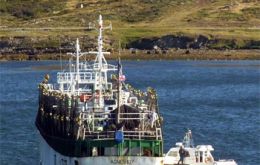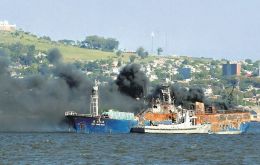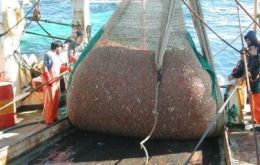MercoPress. South Atlantic News Agency
Fisheries
-
Sunday, March 18th 2012 - 19:48 UTC
Unasur supports Argentine Malvinas and call on UK to resume negotiations

Foreign ministers from the Union of South American Nations (UNASUR) reaffirmed their support for Argentina over the Malvinas Islands sovereignty dispute at the annual meeting held in Asunción, Paraguay.
-
Saturday, March 17th 2012 - 06:10 UTC
US confirms ‘neutral position’ in Falklands’ dispute; hopes for cooperation on practical issues

United States stated that it maintains its “neutral position” over the Falklands/Malvinas Islands dispute between Argentina and UKand hopes for an agreed solution, an official source of the US government assured after the three day visit of British Prime Minister David Cameron which included several meetings at the White House
-
Wednesday, March 7th 2012 - 17:25 UTC
Argentina to demand a review of the South Atlantic fisheries agreement

President Cristina Fernandez announced that Argentina will request the review of the South Atlantic fisheries agreement, because the UK and the Falklands are not abiding by the ‘protocols’ signed in the early nineties.
-
Wednesday, March 7th 2012 - 17:23 UTC
Cristina Fernandez meets Piñera next week: Falklands air link in the agenda

Argentine president Cristina Fernandez is scheduled to travel to Chile next week to meet with her peer Sebastian Piñera and the Falklands issue expected to outstand in the bilateral agenda, particularly air links with the Islands.
-
Tuesday, March 6th 2012 - 05:12 UTC
Falklands names scientist as head of South Atlantic Environmental Research

The Falkland Island Government announced the appointment of Dr Paul Brickle to the post of Director of the new South Atlantic Environmental Research Institute (SAERI).
-
Monday, March 5th 2012 - 05:24 UTC
Korean fishing vessel catches fire in Montevideo: two dead, two seriously injured

Uruguayan fire brigades finally managed Sunday afternoon to control and extinguish the fire that broke out in a Korean fishing vessel early Saturday morning which was fully loaded with fuel and ready to depart for Antarctica, reported the Uruguayan Navy PR department.
-
Friday, March 2nd 2012 - 07:21 UTC
Argentine January exports of fish-shellfish down 13.2% in volume

Argentina exported 24.479 tons of fish and shellfish valued at 81.4 million dollars in January 2012, according to the latest statistics from the National Health and Agri-food Quality Service, Senasa. This represents a fall of 13.2% in volume and 5.6% in value compared with the same month last year, 28.198 tons and 86.2 million dollars.
-
Friday, March 2nd 2012 - 07:11 UTC
EU objectives of fisheries policy are not negotiable, warns Damanaki

Members of the 27 Member States of the European Union (EU) were warned by EU Commissioner for Fisheries, Maria Damanaki, that she is not willing to hand over any of the objectives in the reform of the Common Fisheries Policy (CFP), which is currently being negotiated.
-
Wednesday, February 29th 2012 - 07:36 UTC
Uruguayan navy ousts 13 Brazilian flagged fishing vessels from sovereign waters

The Uruguayan Navy and Coast Guard impeded 13 Brazilian flagged trawlers from entering sovereign waters to fish, according to an official release from the Presidency website
-
Friday, February 24th 2012 - 19:03 UTC
Encouraging start for the Falklands 2012 Ilex season: almost 100 jiggers operating

The Falkland Islands government has issued a high number of licenses for the 2012 Ilex season with almost a hundred jiggers operating which compares positively to previous years, according to the Director of Natural Resources John Barton.
